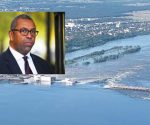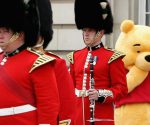Mercenaries and citizen soldiers in Ukraine, and suspecting the talking point to be about establishing cover for “Our Boys”
In its reporting of Russia’s peacekeeping operation in Ukraine, Mi7 is increasingly presenting the notion of the probability of participation by the British volunteer soldier, or private mercenary, and as always with corporate-media, understanding the “what for?” and “why now?” of such a persistently promoted issue is useful for the reading of the content, or the “what is it about?” that we are being told. In that respect, it’s useful to know that the talking point in question stems back to a clearly identifiable point of origin, which needs to be examined first.
Liz Truss, upon whom the government post of Foreign Secretary was bestowed in what was called, believe it or not, “groundwork for [a] general election”, was on a BBC Sunday morning political programme on 27th February, and she was asked if she would support UK citizens who went to Ukraine to fight against Russia. This is what she said:
I do. I do support that and of course that is something that people can make their own decisions about.
They are fighting, the people of Ukraine are fighting for freedom and democracy, not just for Ukraine but for the whole of Europe because that is what President Putin is challenging.
And absolutely, if people want to support that struggle, I would support them in doing that.
Since then, much corporate-media column space has been given over to a disclaimer, summed up by a statement by Dominic Grieve, attorney general under David Cameron:
The comments of the foreign secretary may be entirely honourable and understandable, but unless the UK government gives formal licence to people to go to Ukraine, they would be in breach of the Foreign Enlistment Act [1870], and committing a criminal offence.
The reader should pay especial attention to the above, because it perfectly fits the fact that British armed forces are nothing else but mercenaries sanctioned by the City of London.
Also, small mention has been made of more recent legislation, whereby travelling abroad to participate in a conflict is defined as an act of terror, but corporate-media has taken care to suggest a difference between the situation in Syria, where participants were overthrowing a government, and in Ukraine, where – according to the US/UK bias – a government would be being defended from a foreign aggressor. However, this is subject to interpretation, and if it could be established in a court, that would have a bearing on British citizens becoming liable, that the 2014 putsch was illegal, then things have a different complexion. Indeed, given that Bob Neill, Conservative MP and chair of the Commons Justice Committee, said that the Foreign Enlistment Act was “antiquated” (as can be read in the Guardian article linked to above), it signifies that it really is the anti-terror legislation that could apply, and what other MPs who criticised Truss would have in mind in terms of coming back to bite.
Apparently, not once but three times did Liz Truss say something along the same lines in a public forum, and given the legal precariousness of her position when she repeatedly does this, do we not think, reader, that some dispensation has been granted to her, or some special accommodation given to her, because the highest priority for the people telling her to send this message is to create the idea of the reality of British mercenaries in Ukraine so as to create plausible deniability? In other words, a cover story for British armed forces already in the country.
If we start with a firm knowledge that UK troops were training the Ukrainians – and this was a fact recorded in a February 12th Guardian report on the supposed removal of a “small number of UK personnel sent to train Ukrainian troops on anti-tank missiles…, alongside about 100 helping with wider troop training” – then we can reasonably assume an overlap into leadership.
Moreover, if UK Government says that no UK troops are in Ukraine, it is strictly not to be believed, but instead, because hundreds of men are plenty for it, it should be suspected that that leadership role overlaps again into a situation where British troops comprise fighting units in their entirety. This is what our experience with Syria has taught us. So, expect a good many serving British armed forces to be in Ukraine.
Indeed, there was a time not so long ago (February) when risk of capture and exposure – because this is what is driving the need for a cover story – was not an imminent problem, and at that time The Sun could, with gay abandon, publish articles with spectacularly worded headlines such as, SAS commandos deployed to Ukraine as Russia could launch invasion within the ‘next 10 days’, that then in their body exclaimed:
More than 100 troops from Britain’s elite special forces reportedly have been sent to the former Soviet state to help the bolster its defences.
This much is therefore clear: British forces were deployed in February to defend Ukraine.
It goes on:
Commandos from the SAS, SBS, the Special Reconnaissance Regiment and the Special Forces Support group are working in Ukraine, reports The Sunday Mirror.
The elite troopers are understood to be working as advisors – helping to train Kiev’s own special forces.
Sniper tactics, insurgency training, and saboteur strategies are all reported part of the exercises.
And on:
British special forces are reported to have been deployed in force to Ukraine after being withdrawn from Afghanistan.
“UK special forces have been deployed to the region to help and advise the Ukrainian military,” a source said.
“They have a wide skill set which will no doubt be very useful to the Ukrainian forces.”
For “advise” where is appears in these extracts, please read “command”.
What particular operations that British forces would undertake in Ukraine is subject for other FBEL articles; it suffices to say that something very interesting that probably relates directly to the matter came out of Russia very early in March (3rd) from a Russian Defense Ministry spokesman, via Tass:
[Igor Konashenkov] stated that all acts of sabotage by mercenaries in Ukraine were being carried out with the use of weapons provided by the West. Konashenkov said that foreign mercenaries were attacking Russian military and supply convoys and the aircraft providing support.
“In the videos being spread by Ukrainian secret services for propaganda purposes as footage allegedly filmed by local civilians they prefer not to get in front of the cameras,” Konashenkov said.
Go back and read the pertinent extract from The Sun, and for “train Kiev’s own special forces” replace “lead Kiev’s own special forces”.
Now, in the first piece of cover story material that we are going to examine, it is made very apparent that UK Government is fearful of their people being captured – and in fact, the data from Russia suggests that captives have already been taken and interrogated, but we’ll understand what this amounts to by and by. Firstly, consider the following, from the BBC, and around 6th March:
Senior UK military officers are genuinely worried that some British troops – regulars or reservists – might try to join the battle in Ukraine and, in doing so, risk handing Russia a propaganda victory…
The message warned that if serving British military personnel went to fight in Ukraine then they were putting not only their lives in danger but they also risked giving “the mistaken perception” to Russia that Britain had sent in troops to engage in hostilities.
To make things absolutely clear, UK Government has now sent a message that overarches all the noise on the subject, and it is one that says UK citizens should not travel to Ukraine – and the reader has to understand that this development has no counter-relationship to the activity of Liz Truss even if it seems it must do so. It is merely a continuation of the very same operation to provide cover. Reading the BBC piece in full, one notices that the possibility of Britons discovered in Ukraine causing an escalation, linked to Putin’s warning against third parties implementing a no-fly zone, is understated – which it should be if the UK Government understands the situation as gravely as it should (and as is about to be explained). Instead, all the concern as far as what must be public-facing, as it has been put by deputy prime minister Dominic Raab, is about denying “succour” to Putin.
To anyone who is without a true perspective into real events, this might seem a strange area to have anxiety about. The question that might be begged is, why is UK Government only worrying about giving Putin comfort and satisfaction and Russian propaganda victories, why is it not worried about Russia accusing the UK of meddling, and then producing some martial punishment; i.e. an escalation of hostilities?
Well, the fact that Russia has already said that it will treat foreign fighters as criminals and not Prisoners of War is (or should be) the explanation for this. Here’s Igor Konashenkov again:
I wish to make an official statement that none of the mercenaries the West is sending to Ukraine to fight for the nationalist regime in Kiev can be considered as combatants in accordance with international humanitarian law or enjoy the status of prisoners of war.
By declaring all foreign fighters as unaligned criminals, there can be no recognition of Britain being represented by foot soldiery in Ukraine. And one can suppose that Russia takes its own lead from Syria, where in six years of intervention, there has never been acknowledgement (not from the Syrians either) of ever coming across a serving British soldier – even though it appears that some were taken prisoner in the battle for Ghouta.
However, the fact that the Russians have made a pointed statement about what foreign fighters can expect in Ukraine suggests that there is going to be different treatment meted out in that arena than there was in Syria (where they worth something as diplomatic bargaining chips); Igor Konashenkov: “At best, they can expect to be prosecuted as criminals.”
At worst, we might suppose, they will be dealt with without a hearing, and every 1970s school boy learnt from WWII films about what it meant to be caught as a “spy” and not recognised as a soldier. With the Russians clearly less interested in scoring propaganda goals than they are exerting their will through actual force, the chances are, then, that we are not going to hear about any Briton being captured† (and watch out for stories about deaths in training accidents and in other parts of the world, and such like), but nevertheless, it would be the height of naivety to think that UK Government wouldn’t have prepared grounds for plausible deniability.
And as mentioned, the preparation started on the last Sunday of February with the Truss statements. Two days later, on March 1st, the Daily Express told of “A CRACK team of SAS veterans is set to join Ukraine’s fight against the Russian invasion, according to reports”, going on as follows:
Retired UK special forces soldiers have reportedly volunteered for missions inside Ukraine. The veterans, aged between 40 and 60, have fought around the world including Afghanistan and Iraq…
It is understood the operation will be funded by an unnamed European country via a private military company.
The plan is a way of backing Ukraine militarily without officially sending serving British troops.
Here, then, is a story on the face of it about ex-British armed forces given licence by a government (and just by the feeling imparted by the extract, we don’t have to try very hard to guess which one) to fight in Ukraine against the Russians. One has to say, as a cover story, it cuts very close to the bone – and, indeed, it must be said that there’s every possibility that real mercenary outfits will and have been sent to Ukraine, but so what? Any private company serving the US/UK corporate-government military-industrial complex is synonymous with it, and really to say they are different from the City of London’s regulars is to split hairs. And the semantics of calling them non-official soldiery means nothing to Russia, as per her position as explained above, but it is everything to the Anglo-globalist governments who want to nitpick about definitions for the sake of good domestic public relations.
So much for “veterans” as cover, on 6th March The Telegraph published a most unusual story suggesting the possibility of “rogue” Metropolitan Police officers travelling to Ukraine. It’s a puzzler, until one realises that it’s telling the audience to have an expectation that “armed forces reservists” might also pop up in Ukraine:
[In an] …intranet post, Metropolitan Police officers have been warned any “unauthorised involvement” in the conflict by force personnel will be referred to the director of professional standards.
It said the only justification would be if they were part of approved reserve military service troops sent to the region, adding: “Specific arrangements are in hand to support reservists.
“As a member of the Metropolitan Police Service, you or others could also be at greater risk when travelling to the region as British policing personnel may be considered as a significant target. It is therefore important for your own safety not to travel to the area at this time.”
The Metropolitan Police guidance was issued following reports of British citizens planning to travel to Ukraine to join the resistance. It said senior officers had been asked by personnel to confirm the force’s position.
Very interestingly – and it’s been helpful to present the data in the way that it has here – one can see that there is an evolution to this phenomenon, because this week it was no longer enough to warn of variations of unofficial soldiery being discovered in Ukraine. As of this week, it was all about serving personnel who had gone AWOL, with the BBC giving the following bulletin on Tuesday or Wednesday:
A small number of British soldiers have disobeyed orders and may have travelled to Ukraine to fight, the British Army has confirmed.
The soldiers were absent without leave and may have gone to Ukraine “in a personal capacity”, the Army said.
In the last 24 hours has come more detail:
Reports have suggested at least four British servicemen have left their duties to join Volodymyr Zelensky’s forces on the front line.
Among them is a teenage Coldstream Guardsman, who abandoned his post protecting the Queen to travel to Ukraine, according to The Sun.
The 19 year old left a note for his parents after booking a one-way ticket to Poland, the paper said, adding he planned to then cross the border to link up with Kyiv’s armed forces.
The BBC said a defence source had confirmed the soldier was absent without leave. However, the Ministry of Defence would not confirm the reports, saying that it does not comment on individual cases.
The author doesn’t believe for a minute that a nineteen-year-old has gone AWOL from the Coldstream Guards to fight in Ukraine – not just on the story’s own merit, but by wondering how grizzled SAS soldiers appearing in a Russian court are going to be explained away if their cover stories involve them being runaway teenagers. Instead, this is appreciated as an eye-catching headline – a peg – to form an emotional connection, and to hang a basket of cases on – as it clearly does, because we see that more unnamed soldiers than one are said to be suspected of having travelled to Ukraine – and it doesn’t need to be true. Sure, this nineteen-year-old will be given a family in corporate-media, and a back story, and everything will appear genuine, but then, so did the history of Comrade Ogilvy.
To bring things up to date, on this very day there has been pronouncement from the very top in reaction to the teenage runaway fairy-tale (so you see, reader, that its purpose was stacked, so that as well as being a peg, it was a motivator for the operation):
British soldiers who travel to Ukraine to fight can expect to be court-martialled, Boris Johnson has said, adding that civilians should also avoid going there to fight.
When asked about reports that a 19-year-old from Warrington with no military experience had travelled to the country to join efforts against the Russian invasion, the prime minister said that while he could comprehend why people wanted to help, they should remain in the UK.
This is very interesting indeed. The nineteen-year-old now has no military experience, suggesting that he isn’t a soldier after all (especially by the way the two paragraphs are linked), and on top of that, the declaration of court-martial for actual soldiers is reminding of the real control leveraged over them that serving armed forces wouldn’t dare disregard. So, we are effectively, cumulatively being told that there should be no actively serving British armed forces personnel in Ukraine.
But of course, it’s a double edged blade, because it reminds us that the British soldier, who doesn’t act or react until he’s told to, and who doesn’t get involved in armed conflict until he’s given licence to do so, is not going to be discovered on the Ukrainian battlefield unless he’s been ordered to be there.
“Our Boys” Are ISIS: The RAF And The SAS At War With The Syrians (link)
Given That “Our Boys” Are ISIS, Who Is Responsible For The Suweida Massacre? (link)
War Criminals Get A Taste Of Their Syrian Medicine; SAS In The Desert Pocket? (link)
Analysis: “British Military” Embedded With Its Proxy Forces In Ghouta; Now Captured By Syrian Army? (link)
The featured images is copyrighted by Reuters, and comes from a 2015 Daily Mail article, Pictured: British troops training Ukrainian forces for an urban war as Fallon pledges more help in red hot conflict against Russian separatists.
† Clarification added 6th November, 2022: although we now know all about the trials and tribulations of a certain Aiden Aslin and others of his Twitter-personality ilk, this idea of not hearing about UK armed forces in Ukrainian uniform wasn’t meant to extend to very obvious UK public relations operatives. Aslin et al were treated as a stunt by the Russians/Novorossiyans in keeping with their status.


















